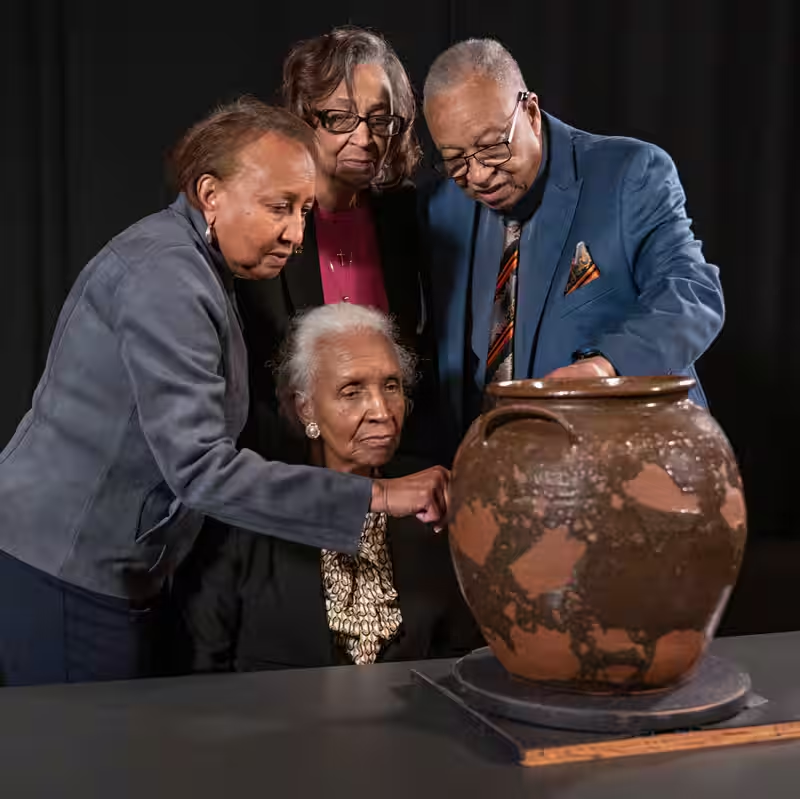David Drake Pottery Restitution: A Landmark Moment in Art and Justice
In a groundbreaking move that bridges centuries of injustice, the Museum of Fine Arts, Boston (MFA) has officially returned ownership of two stoneware vessels to the descendants of David Drake—the enslaved 19th-century potter whose artistry defied the brutal constraints of slavery.
This decision marks the first time a U.S. museum has resolved an ownership claim for artwork created under slavery, acknowledging that Drake was “deprived of his creations involuntarily and without compensation.”
Who Was David Drake?
Born into slavery in South Carolina around 1800, David Drake—often known as “Dave the Potter”—crafted massive stoneware jars used for food storage on plantations. But what made his work extraordinary wasn’t just its scale or craftsmanship.
At a time when it was illegal for enslaved people to read or write, Drake boldly inscribed his pots with his name, dates, and even original poetic verses. These inscriptions were acts of quiet rebellion—testaments to his humanity, intellect, and enduring spirit.
One surviving verse reads: “I made this jar for cash— / though it was made in a rush.” Another simply states: “Dave belongs to Mr. Miles / wher he makes large jars and viles.”
From Enslavement to Museum Display
After emancipation, Drake adopted the surname of his first enslaver and continued his craft. Over time, his pottery entered private collections and eventually major institutions—including the Met, the International African American Museum, and the MFA Boston.
For decades, these pieces were admired as folk art—but rarely contextualized as products of forced labor and systemic theft.
A Historic Agreement
The MFA’s recent agreement with Drake’s living heirs represents a seismic shift in museum ethics. Under the terms:
- Legal ownership of two vessels has been formally restored to the family.
- One piece remains on public display as a long-term loan from the heirs.
- The museum repurchased the second vessel from the family, ensuring its continued presence in the collection—but now with rightful provenance.
“This isn’t just about returning objects,” said a spokesperson for the Drake family. “It’s about restoring dignity, correcting history, and honoring a man who created beauty under unimaginable oppression.”
Why This Matters Now
The restitution comes amid a growing national reckoning with cultural heritage and reparative justice. Museums worldwide are reevaluating collections tied to colonialism, war, and slavery.
What makes the MFA’s action especially significant is its explicit recognition that Drake’s work was stolen through the institution of slavery itself—not through looting or wartime seizure, but through a system that denied him personhood and property rights.
David Drake Pottery: A Symbol of Resistance
Drake’s pottery has become more than art—it’s a historical record. His inscriptions provide rare first-person documentation from an enslaved person in antebellum America.
Scholars note that fewer than 200 signed pieces by Drake are known to exist. Each one is a fragile, powerful link to a silenced voice.
| Detail | Information |
|---|---|
| Artist | David Drake (c. 1800–c. 1870s) |
| Known For | Inscribed stoneware pottery created while enslaved |
| Restitution Date | October 2025 |
| Institutions Holding His Work | MFA Boston, The Met, International African American Museum |
What’s Next?
The MFA says this case sets a precedent for future claims involving enslaved creators. While each situation is unique, the museum is now developing a formal framework to evaluate similar restitution requests.
For the Drake family, this moment is both healing and hopeful. “We’ve waited 150 years,” one descendant said. “But today, David Drake is finally recognized not just as a craftsman—but as an artist who owned his genius, even when the law said he owned nothing.”




